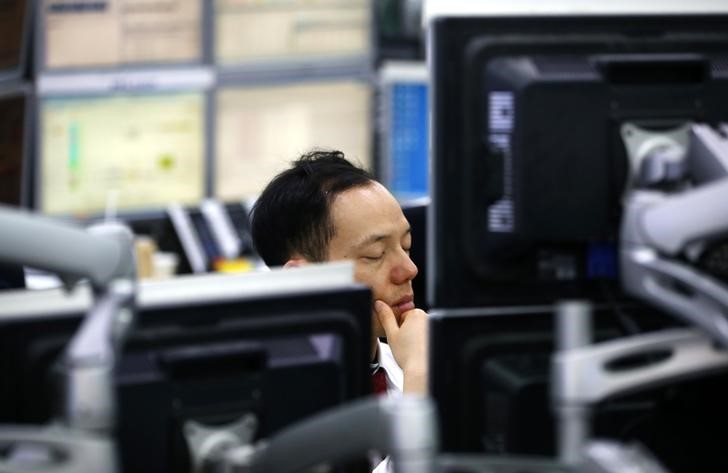By Sujata Rao
LONDON (Reuters) - The roaring stock market rallies of the United States, Japan and Europe show no sign of reaching most emerging markets, where lacklustre economic growth and company profits point to a fifth straight year of lagging performance.
Emerging markets are the black hole in the global equity picture at a time when Wall Street has hit record highs, European stocks are at seven-year peaks and Japanese markets at the highest in 15 years, buoyed by central bank money-printing and recovering economies. (SPX) (STOXXE) (TOPX)
MSCI's emerging equity index, in contrast, stands more than 20 percent below record highs hit in 2007 (MSCIEF) and despite notable exceptions such as India and China (BSESN) (CSI300), it has lagged the world index by more than 50 percent since end-2010.
Dedicated emerging equity and exchange-traded funds have seen outflows of $60 billion (41 billion pounds) in the past two years, according to EPFR Global data cited by JPMorgan (NYSE:JPM) Asset Management.
And now, with the United States to start raising interest rates and emerging currencies wilting against the resurgent dollar, U.S.-based investors have even less incentive to place cash in the sector.
"The call we are making is developed markets versus emerging equities, and despite strong outperformance in DM since the end of 2010, we don't see any reason to reverse our position," said Jonathan Lowe, portfolio manager in JPMorgan Asset Management's multi-asset group.
"In fact, the amount of stimulus we are seeing in places like Japan and euro zone is wanting us to be more underweight EM," Lowe added.
More than half of the global investors surveyed by Bank of America/Merrill Lynch in March said emerging markets was the asset class they would underweight in the coming year.
SLOWER GROWTH
Several things have gone wrong, the first being that emerging markets are on track for a sixth straight year of slowing economic growth, shrinking the traditional growth premium they enjoy over advanced peers.
That premium will be less than 2 percentage points this year, the International Monetary Fund predicted this week, compared with 4.5 percent as recently as 2013. And with Chinese growth at a six-year low, short-term improvement seems unlikely.
Consumption and fixed capital formation in emerging markets both slowed in the last quarter of 2014, while export growth has declined for three years straight, UBS analysts said.
This in turn has caused disappointment on the earnings front - even in India where stocks are up a third since end-2013, 40 percent of companies undershot earnings forecasts in the latest quarter, Morgan Stanley (NYSE:MS) noted.
"If we get 3.5 percent global growth this year that's going to be on the high side. You need 4 percent global growth to get a pronounced pick-up in EM profitability," Lowe said.
Earnings-per-share (EPS), a key profitability marker, will have grown at a compounded annual rate of 3.8 percent between 2013-2016, Morgan Stanley calculates, contrasting this with 15 percent in Japan.
EPS will grow by 1.6 percent in 2015, the bank predicts. For Japan it expects 16 percent.
POOR RETURN ON EQUITY
Emerging markets rely on big state-run banks, mining and oil companies, which have been unable or unwilling to cut costs or employees in the manner of Western rivals.
Because companies did not cut costs when growth and export markets soured, return on equity (ROE), a gauge of how efficiently a company uses shareholders' equity investment to generate profits, started declining in emerging markets after 2008 and has yet to recover: http://link.reuters.com/wyr57v
Emerging markets companies earn 12.6 cents for each dollar of shareholder money invested - three cents below U.S. rivals.
"In the United States the first two years of the bull market happened not because the economy was recovering but because companies were efficient in cutting costs, and that in EM has not happened yet," said Jorge Mariscal, chief investment officer for emerging markets at UBS Wealth Management in New York.
"Once world growth starts recovering faster, then it is difficult for me to envision that EM will continue to lag behind...but we are 6-12 months away at least from that."
One of the few things favouring the sector is that stocks in MSCI's emerging index are cheap relative to history, trading at an average 11.6 times predicted earnings while developed equities are at nearly 17 times: http://link.reuters.com/rut87v
Fund managers with freedom to invest off-index can also find opportunities. Emerging indexes skew towards big countries such as Brazil, often masking outperformance in tiny markets such as Hungary which has rallied 15 percent this year in dollar terms.
Mariscal, for instance, has less allocation to emerging markets than their weight in global indexes but is tactically overweight in Taiwan, India and Philippines, noting improving growth and company earnings among other factors.
That bifurcation may deepen as U.S. interest rates rise.

In markets such as Taiwan and South Korea, a broadening U.S. recovery may boost earnings, UBS analysts note. But in others like Turkey, Brazil and South Africa, recovery may be further off because their cost of equity is tied to the United States but earnings rely on European and Chinese growth.